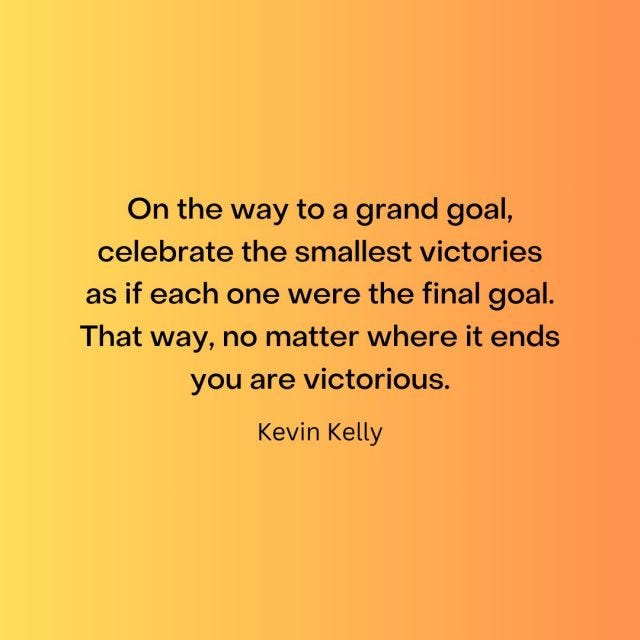For Starters #6: When's Success?
The tourist enthusiastically continues, "Then, without a care in the world, you could sit here in the harbor, doze in the sun, and look at the glorious sea."
"But I'm already doing that", says the fisherman.
- Heinrich Böllm, https://en.wikipedia.org/wiki/Anekdote_zur_Senkung_der_Arbeitsmoral
When I first went out on my own, I was working toward a definition of success declared by twentysomething me, "support your lifestyle while working for yourself, out of your house." Due to a fortunate meeting w/ a 1990s-era graphic designer in rural western Wisconsin, I did have model of what it might look like, however my professional experience suggested it was unattainable on any time horizon.
Not that many years later I looked around and noticed three things:
I had achieved it.
I hadn't realized I had achieved it.
I was playing an infinite game (https://en.wikipedia.org/wiki/The_Infinite_Game)
This triplet meant, I hadn't given myself credit for any milestones along the way, let alone the achieving the pre-defined success state. It also meant that I didn't know what to do next.
Like the proverbial dog that caught the car, I was left asking myself, "Now what?"
(DALL·E 2023-11-03 14.52.14 - cartoon of a dog chasing a car in its mouth, asks "now what?")
This isn't uncommon.
Just this past week, I had multiple conversations with experienced executives, and the advisors serving them, all asking some version of "Now what?"
In hopes of not needing to answer this question again in my professional career, I'm drafting a (hopefully) richer, more intentional, measure of success. Though, there's one key aspect of the previous goal I'm maintaining - the pre-commitment ("for yourself, out of your house").
Much like my "Always order the fish tacos" rule (#7 in The Rules - https://garrickvanburen.com/the-rules/ ), I find pre-commitments magical in how they simplify, focus, and re-inforce (see also https://en.wikipedia.org/wiki/Point_of_no_return ).
Similarly, defining a north star ( https://anchoradvisors.com/north-stars-and-next-steps/ ) for success from the beginning simplifies and focuses both the day-to-day decision making:
if "success is becoming the largest player in the market", external funding should be pursued immediately to support aggressive scaling, which would be avoided
if "success is professional independence", here there may not even have a business partner.
if "success is creating an asset worth selling", the day to day decisions will be very different than
if "success is helping 500 startup founders"
Unlike the "keep the options open" mentality we talked about with customers and investor in an earlier installment - https://tinyletter.com/garrickvanburen/letters/for-starters-5-navigating-minnesota-nice-or-all-the-whys-customers-say-no - starting a new venture requires aggressively, pre-maturely, pruning timelines.
decide (v.) late 14c., "to cut off," from de "off" (see de-) + caedere "to cut" (from PIE root *kae-id- "to strike")
Even with aggressive pruning, I'm continually surprised at how wide the success state turns out to be. This is a reminder that the world is big and addressable markets are like icebergs and Zealandia ( https://en.wikipedia.org/wiki/Zealandia ).
Yes, to fully capture the opportunity on the ground, strategies sometimes need to change. Some definitions of success are easy to revise in-flight, and others are far more difficult. For starters, focusing on securing paying customers supports both the 'professional independence' and the 'largest player in the market' definitions of success listed above. However, it's much easier to secure funding after being independent (presuming a revenue positive business) than it is to go independent after securing funding.
I encourage you to take some time with me this week to declare, or review, your personal success state of your current professional venture.
Would past you be in awe of where current you is?
Have you already surpassed your wildest definition of success?
What does 'done' look like?
When is 'done'?
The most useful exercise I've found in answering these questions is adapting a question from Andrew Chen ( http://andrewchen.com/the-next-next-job/ ):
“What's the next next success you want and why can't you have it right now?
Success just might be closer than it appears.






